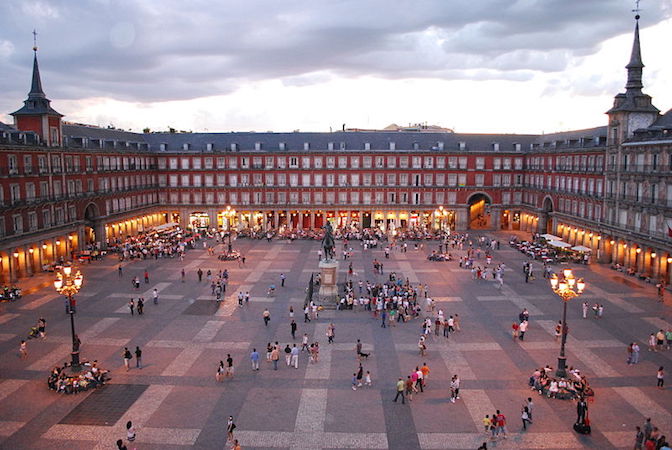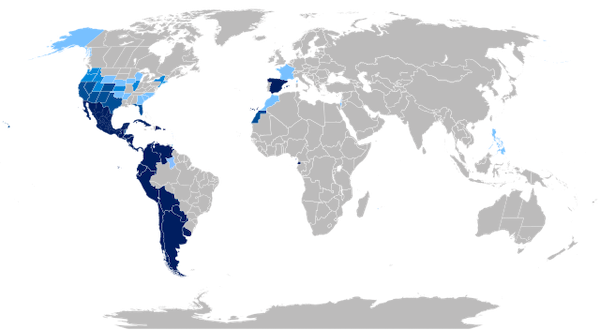
Let’s begin by taking some quick virtual tours
SPAIN
SOUTH AMERICA
- Discover the beauty of South America
- Visit Argentina
- Bolivia top tourist attractions
- Chile travel
- Discover the beauty of Colombia
- Colombia regions and destinations
- Ecuador travel
- Top things to do in Paraguay. Culture Trip
- Peru travel
- Uruguay Natural
- Venezuela. Lonely Planet
MEXICO, CENTRAL AMERICA AND SPANISH-SPEAKING CARIBBEAN
- Discover the beauty of Mexico
- Visit Mexico
- Discover the beauty of Central America and the Spanish-speaking Caribbean
- Visit Costa Rica
- El Salvador
- Visit Guatemala
- Honduras Travel
- Visit Nicaragua
- Welcome to Panama
- Cuba Travel
- Go Dominican Republic
OUR LESSONS

Are you planning to visit Madrid and the other regions of Spain? Or perhaps you are considering a trip to Latin America.
With our Basic Spanish course, you will learn key phrases and idioms plus more than 1,000 of the most common words in Spanish. Try our 40 free online lessons that use a unique cultural-tourism approach.
PART A: BASIC SPANISH
Talking about yourself, family and friends
E1: Introduction to the Spanish language
(alphabet; parts of speech)
E2: Meeting new people: greetings, introductions, farewells. Titles
(simple present tense of the irregular verb ‘to be’; subjects and verbs; word groups (phrases, clauses, sentences)
E3: Talking about your family, relatives and friends
(personal pronouns; simple present tense of the irregular verb ‘to have’)
E4: Talking about countries, nationalities and languages
(simple present tense of regular verbs; prepositions ‘from’ and ‘in’; interrogative words)
E5: Talking about the weather, seasons and climate change
(the definite articles; omission of definite articles; formation of nouns and adjectives)
E6: Talking about clothing, accessories, fashion and appearances
(colors; qualifying adjectives; the possessive adjectives; the gender of nouns and adjectives)
E7: Talking about your home. Rooms, furniture, appliances. Size, shapes, colors
(indefinite articles; the active mood of the verb)
E8: Stating your age, address and phone number. Telling time
(cardinal numbers; prepositions of direction; prepositions of location and direction; time prepositions; imperative; giving directions; syntax of simple sentences; time adverbs/ now, before, always)
E9: Talking about the days of the week and the months of the year. Appointments
(ordinal numbers; time expressions; direct and indirect objects; transitive and intransitive verbs)
E10: Talking about your leisure time and hobbies. Routines
(adverbs; frequency adverbs; reflexive verbs)
E11: Talking about key life events. Births, engagements, weddings, anniversaries, deaths
(the simple past tense)
Talking about your community
E12: Talking about the education system. Levels and subjects.
(imperfect tense; comparative and superlative adjectives)
E13: Talking about work. Occupations. The office environment
(future plans; subject pronouns)
E14: Talking about religion. Places of worship
(types of nouns; relative pronouns)
E15: At the bank. Foreign exchange. Types of accounts. Credit and debit cards
(adverbial pronouns)
E16: At the post office
(adverbial pronouns)
E17: At the library. At the bookstore. Talking about literature
(I like)
E18: At the restaurant. At the cafe. Different types of cuisine
(nouns of quantity; I wish; common expressions with the verb ‘have’)
E19: At the supermarket. Farmers’ markets. Flea markets
(expressions with the verb ‘..’; nouns of numbers/a dozen of; fractions; multiple numbers/ twice a day, half a loaf)
E20: At the doctor. At the dentist. At the pharmacy. Talking about your health.
(irregular past participles; agreement of past participles of verbs conjugated with ‘to have’; negative forms; common expressions with the verb ‘…’)
Introduction to Spain and Latin America
E21: At the airport. Check-in and departures; on the plane; arrivals
(present continuous tense; common expressions with the verb ‘…’; past participles of verbs)
E22: At the hotel
(polite requests with the conditional)
E23: Taking a sight-seeing tour. River cruises
( conjunctions; the partitive article)
E 24: At the aquarium. At the zoo.
(progressive tense; Forms of the present gerund; use of the gerund )
E25: Talking about the architecture. Buildings and bridges
(common expressions with the verb ‘…’)
E26: Talking about art. Museums, monuments and statues
(capitalization and small letters; exclamations; demonstrative adjectives)
E27: Talking about the economy of Spain
(object pronouns)
E28: Talking about emergencies. Police. fire, ambulance services
(types of emergencies/ fire, ambulances, natural disasters)
E29: Talking about festivals and celebrations in Spain
(impersonal pronouns)
E30: Talking about the geography of Spain
(subjunctive)
E31: Talking about the government of Spain
(abbreviations and acronyms)
E32: Talking about the history of Spain
(narration of events in the past)
E33: Talking about the media in Spain
(punctuation)
E 34: Talking about music and the performing arts in Spain
(comparison of inequality and equality; absolute superlative; prepositional modifiers)
E35: Talking about national symbols
(the passive mood of the verb)
E36: Talking about planetariums
(adjectives followed by prepositions; They are not used to walking)
E37: Talking about shopping in Spain
(construction of reflexive verbs in compound tenses)
E38: Talking about sports in Spain
(compound nouns/ sky diving)
E39: Talking about transportation in Spain
(subjunctive after impersonal expressions/ It’s necessary that you arrive early.)
E40: Talking about wine and other alcoholic drinks
(syntax of complex sentences; coordinating conjunctions)
PART B: BILINGUAL READINGS ABOUT SPAIN
- Agriculture
- Culture
- Energy
- Fashion
- Industry
- Literature
- Security Forces and Military
- UNESCO World Heritage Sites
- Wildlife and marine life
PART C: TOP TOURIST DESTINATIONS + ATTRACTIONS
SPAIN
- Alicante
- Barcelona
- Bilbao
- Burgos
- Cadiz
- Cordoba
- Granada
- La Coruna
- Leon
- Logrono
- Madrid
- Malaga
- Palma de Mallorca
- Pamplona
- San Sebastian
- Seville
- Taragona
- Toledo
- Valencia
- Zaragoza
SOUTH AMERICA
- Argentina
- Bolivia
- Chile
- Colombia
- Ecuador
- Paraguay
- Peru
- Uruguay
- Venezuela
CENTRAL AMERICA AND MEXICO
- Costa Rica
- El Salvador
- Guatemala
- Honduras
- Nicaragua
- Panama
- Mexico
CARIBBEAN
- Cuba
- Dominican Republic
- Puerto Rico
Visual Vocabulary
Bilingual Dictionaries (English-Spanish, Spanish-English)
- Word Reference
- Cambridge
- Reverso
Media
More Online Resources


